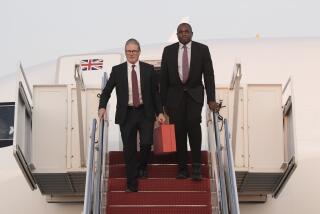If talks on Ukraine fail, Obama would consider sending arms, he says
President Obama acknowledged Monday that he is considering arming Ukraine’s military if a diplomatic push fails to yield a cease-fire with Russia-backed separatists, but he sounded skeptical that sending weapons would defuse the conflict that has killed more than 5,000 people.
In a news conference with German Chancellor Angela Merkel, Obama said that months of diplomacy and economic sanctions had not turned Russian President Vladimir Putin “from following the course that he is on.” But Obama also was wary of the most-discussed alternative: sending weapons to the outgunned Ukrainian army.
“Can we be certain that any lethal aid that we provide Ukraine is used properly, doesn’t fall into the wrong hands, does not lead to over-aggressive actions that can’t be sustained by the Ukrainians?” Obama said. “What kinds of reactions does it prompt, not simply from the separatists, but from the Russians? Those are all issues that have to be considered.
“The measure by which I make these decisions is, ‘Is it more likely to be effective than not?’”
The president said he had not decided whether to arm Ukraine and tried to emphasize that, for now, the West is united behind sanctions and another round of negotiations. The leaders of Russia and Ukraine are slated to meet, along with their French and German counterparts, for more talks Wednesday in Belarus.
Despite the professed unity, the question of arming Ukraine has revealed increasing divisions among Western allies. Some key officials, including Obama’s pick to be the next Defense secretary, have said they are open to sending arms to help Ukraine push back against the separatists. Merkel, however, has been unequivocal in her opposition to such a plan.
Merkel said Monday that she plans “to put all our efforts in bringing about a diplomatic solution.”
The leaders vowed that they would not “stand idle and simply allow the borders of Europe to be redrawn at the barrel of the gun,” Obama said.
Obama and Merkel met privately for a series of discussions initially aimed at sketching out an agenda for the Group of 7 summit of world leaders in Germany in June. But the escalating crisis in Ukraine dominated the morning talks, Obama said.
Despite a steadily ramped-up regimen of sanctions that have helped to weaken his country’s economy, Putin has for months rejected calls to withdraw support for separatist groups fighting to join Russia in eastern Ukraine.
Obama critics say he is failing to speak the only language Putin understands, that of power and strength. If Putin’s aggression in Ukraine means that he gets bogged down in a more expensive and bloodier fight, the theory goes, he’s more likely to rethink the strategy.
Obama’s reluctance to provide weapons suggests that “it is better to be America’s enemy than her friend,” said Sen. Lindsey Graham (R-S.C.), a member of the Senate Armed Services Committee.
“The Ukrainian people do not have time for President Obama’s ‘strategic patience,’” Graham said. “It is time for President Obama to quit equivocating and quickly provide Ukraine the defensive weapons it needs.”
But administration officials are mindful of Merkel’s concern that bolstering Ukraine’s military would serve mainly to provoke Russia into significantly escalating its military position in the country.
“What Merkel has been saying is, ‘All you’re going to do is shake their cages, and you still won’t be able to equip Ukraine enough to match the supremacy of the Russian military,’” said Heather Conley, director of the Europe program at the Center for Strategic and International Studies.
Also on the agenda Monday for Obama and Merkel was the looming deadline in the talks over Iran’s nuclear program. Obama told reporters he saw the end-of-March deadline as a final decision point for the Iranians. After two extensions and months of negotiations, “the issues now are sufficiently narrowed and sufficiently clarified,” Obama said.
“We’re at a point where they need to make a decision,” he said. “I don’t see a further extension being useful if they have not agreed to the basic formulation and the bottom line that the world requires to have confidence that they’re not pursuing a nuclear weapon.”
For more White House coverage, follow @khennessey and @cparsons
More to Read
Sign up for Essential California
The most important California stories and recommendations in your inbox every morning.
You may occasionally receive promotional content from the Los Angeles Times.












